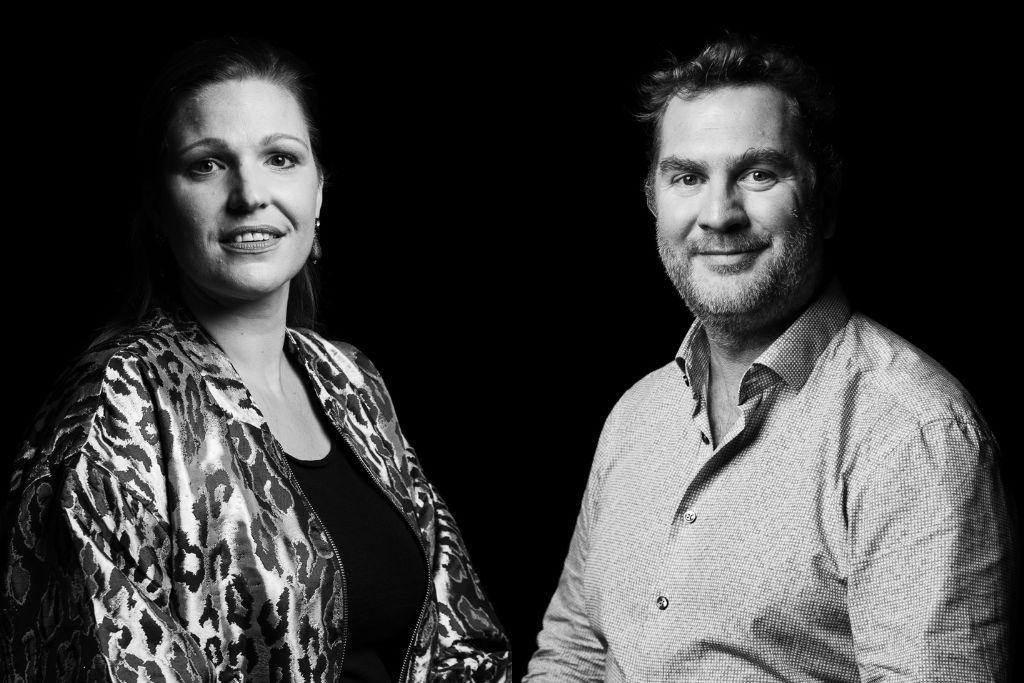A multicoloured orchestra depicts an intimate relationship drama
They’ve only just met, but as Bluebeard and Judith, they are diving straight into rehearsals for Bluebeard’s Castle. That’s why top soloists Deirdre Angenent and Thomas Oliemans take some time after rehearsing to have a chat and get to know each other on a more personal level. What do they think of Bartók’s music, how do they prepare, and who is that mysterious third character?
Thomas: “Deirdre, you’ve sung Judith many times before and know her inside out by now. What still makes the role so interesting to perform?”
Deirdre: “The music! It goes straight to your soul. And what’s fascinating is that since I first sang this role about eleven years ago, I keep gaining new insights. Everything I experience in life makes ‘my’ Judith slightly different in each phase. That keeps it really dynamic. The same goes for the technical side of singing. I can keep exploring new nuances because my voice is capable of them now. In that sense, it remains a constant discovery.”
Deirdre: “It’s your role debut, Thomas. How have you prepared?”
Thomas: “Very slowly and carefully! The Hungarian language alone is incredibly difficult, as I can’t relate a single word to any other language I know. Then there’s the character of Bluebeard, who is particularly complex. And, of course, there’s Bartók’s sound world, his musical language, which is completely unique. There’s no other piece quite like this.”
Deirdre: “Yes, so many different tonal colours in the orchestration.”
Thomas: “Exactly! There’s a ninety-five-piece orchestra behind us, but it doesn’t sound like one big mass; it’s full of layers, a vast array of colours.”
Deirdre: “Maybe we could even see the orchestra as the third character in this story.”
Thomas: “The musicians express the richness of the tension between the two of us… That’s what I love about this work; Bartók composed Bluebeard’s Castle in such a way that the tension is sustained throughout the whole hour. Once the musical engine starts, you’re swept along with it.”
Deirdre: “This piece is so well crafted that you can’t help but be drawn into the emotional world of Judith and Bluebeard.”
Thomas: “I often lose my sense of time and space. It’s a very hermetic, inescapable world.” Deirdre: [laughing] “Just like Bluebeard’s castle.”
Thomas: “What are you most looking forward to during the rehearsals and performances of Bluebeard’s Castle?”
Deirdre: “I always find the rehearsal process the most interesting part. Creating this production together and discovering the roles. And then, of course, it’s thrilling to bring it to an audience – what do they think of what we’ve made, and how does it affect them? And you?”
Thomas: “I’m really curious to see how the audience engages with the intimacy of this story. I think that’s almost inevitable because of the genius of the piece and the fact that it speaks to you on multiple levels. The way you experience it depends on your stage in life and how you view things. It can be seen as the ultimate breakup story, but it’s also about loneliness and tenderness.”
Deirdre: “There’s something relatable in it for everyone.”
Thomas: “Absolutely. Bluebeard’s Castle is essentially a fairytale, so we can pretend it’s not about us. But everyone probably recognises how impossible (some) relationships can be. Of course, there are exaggerations – weapons and blood – but it’s really about two ordinary people.”
Deirdre: “Yes, the whole idea of ‘why won’t you open up to me?’ is something I recognise – and I think many people do too. But the question is: how much do you want to know about each other…?”
Interview: Kyra Bertram
